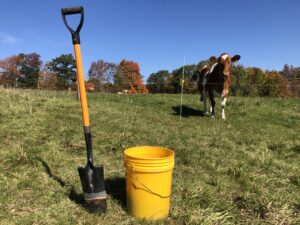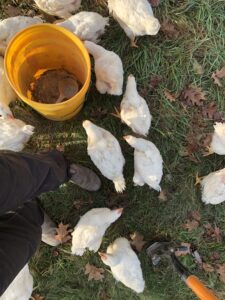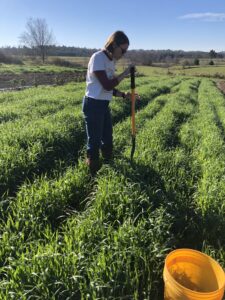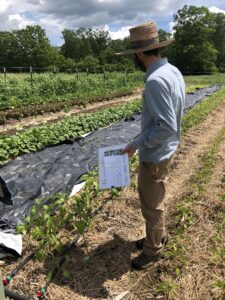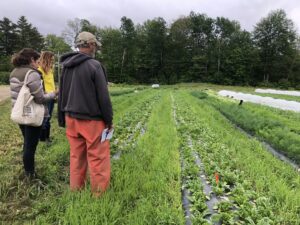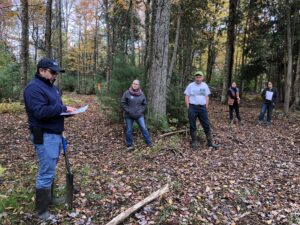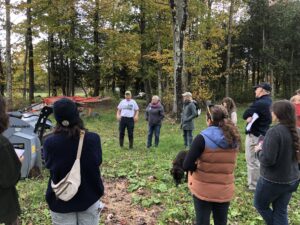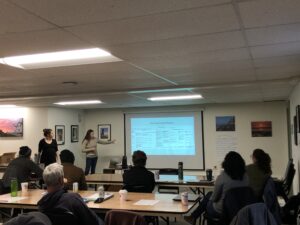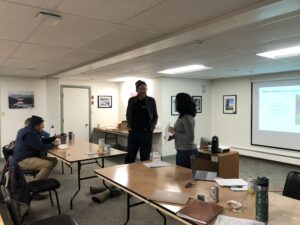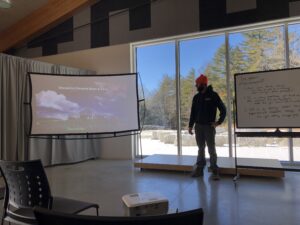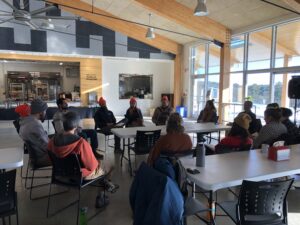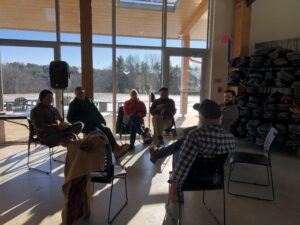Final report for ONE21-398
Project Information
Soil health is a critical component of thriving farms and a key strategy for improving climate resilience. To address this need, the Maine Soil Health Network was formed through a collaboration between Wolfe’s Neck Center (WNC), Maine Farmland Trust (MFT), and the Pennsylvania Association for Sustainable Agriculture (Pasa). The primary goal of the Network was to create a local collaborative of Maine farms, fostering shared knowledge and building a community focused on soil health and climate resilience.
During the pilot project, 16 Maine farms were enrolled in Pasa's Soil Health Benchmarking Study. This study paired soil sampling with management record-keeping to help farmers assess the health of their soils and compare their results with those of peer farms. In addition to on-farm research, farmers participated in a peer-to-peer learning network, which included full-cohort educational gatherings, webinars, on-farm tours and workshops, and various networking opportunities.
Farms were also offered the chance to pursue professional development and educational opportunities, along with technical support to develop climate adaptation plans to improve climate resilience. Over the course of the pilot, the Maine Soil Health Network supported 16 farms through 2-3 years of the Soil Health Benchmarking Study, hosted more than 21 virtual and in-person events, and laid the groundwork for ongoing farmer engagement around improving soil health and climate resilience. Following the pilot, Maine farmers will continue to have access to the Soil Health Benchmarking Study and the climate adaptation planning process through MFT's newly established Climate Resilience program.
This project seeks to:
1: Support Maine farmers in learning about their soils to improve soil health
2: Take thorough soil health measurements and collect management data
3: Submit Maine data to Pasa’s Soil Health Benchmark Study; Pasa will produce reports for farmers to compare and learn about their soils
4: Coordinate ongoing farmer outreach, education, and collaborative engagement
5: Develop a peer-to-peer network of farmers interested in soil health and climate resilience, to support one another and share field management techniques
A 2019 Statewide Engagement Process on Maine Farmers’ Needs & Priorities indicated that farmers’ greatest need is for a variety of information, resources, and education to support day-to-day farm operations, including skills related to managing soils (Skakalski, 2019). Farmers are limited in their access to the information, technology and finances needed for the large-scale adoption of practices that improve soil health. Measurement tools are often expensive, proprietary, and do not communicate with each other, creating data silos and withholding insights from farmers to help manage land effectively.
MFT and WNC are engaging farmers in the Maine Soil Health Network to implement climate-friendly practices on a wide range of farms across the state. Farmers in the network receive financial and technical support to monitor soil health on their farms (Soil Health Benchmarking Study) and commit to participating in regular workshops to share results with other members of the cohort and technical assistance providers. The long-term vision for the Maine Soil Health Network is to support a farmer-led peer learning model around climate-friendly practices in Maine.
The Maine Soil Health Network will utilize tools and technology developed by OpenTEAM, (Open Technology Ecosystem for Agricultural Management), an initiative for using open-source technology to improve soil health and share information and resources between farms. Led by WNC, a collaborative group of farmers, scientists, industry leaders and agriculture technologists, OpenTEAM technology offers field-level carbon measurement, digital management records, remote sensing, predictive analytics and input and economic management decision support in a connected platform that reduces the need for farmer data entry while improving access to a wide array of tools. The participating farms in the Maine Soil Health Network will utilize OpenTEAM technology to track management practices and soil health.
The Maine Soil Health Network is collaborating with Pasa (Pennsylvania Association for Sustainable Agriculture) as the Maine cohort for their Soil Health Benchmark Study, a citizen science project aiming to help farmers assess the health of soils, compare data to their peers, and track changes in soil over time with different management practices. The study seeks to allow farmers to learn from each other and to develop solutions to soil health problems in their production systems. Pasa is part of the OpenTEAM network, and current farms in the Benchmark study are already utilizing OpenTEAM technology to measure soil health. The Maine cohort now joins hundreds of other farms across Pennsylvania and Maryland in measuring their soil health on-farm.
Agricultural natural climate solutions have been identified as important strategies for improving farm viability and contributing to state-wide climate change mitigation. By improving soil health, Maine farmers can see an increase in yields and profits per acre, as well as enhanced adaptation and resilience (Daigneault, Simons-Legaard, Birthisel, Carroll, Fernandez, and Weiskittel, 2020). To achieve these benefits, the proposed Maine Soil Health Network presents an organized program for providing training, technical and financial soil sampling and analysis interpretation support to farmers throughout the state with the goal of improving soil health on farms.
Cooperators
- - Producer
- - Technical Advisor
- - Producer
- - Producer
- - Producer
- - Producer
- - Producer
- (Educator and Researcher)
- - Producer
- - Producer
- - Producer
- - Producer
- - Producer
- - Producer
- - Producer
- - Producer
- - Producer
Research
In spring 2021, MFT secured 8 farm partners throughout the state as program participants for the pilot cohort of the Maine Soil Health Network. Each of these farmers represented a diversified vegetable or livestock/dairy farming operation, are MFT easement holders, and committed to staying in the program for at least 3 years. The combined support from the Northeast SARE award and a Maine CIG award allowed our pilot cohort of farmers to participate in the PASA soil Health Benchmarking study, and supports the participating farmers with travel, accommodation, and educational stipends to access educational opportunities around soil health and climate friendly farming practices. This added financial support for farmers was meaningful in advancing their learning and soil health goals.
Unfortunately, in January 2022 two of the participating farms decided to remove themselves from the Maine Soil Health Network. Songbird Farm is facing a major PFAS contamination on their small grains and vegetable operation. Luckily, grains do not take up the PFAS which has allowed them to save their crop this past season, but the farm is facing long term soil contamination problems. They simply do not have the bandwidth for anything else at this point. We still plan to give them the results from the soil testing performed in fall 2021, but they do not want to be involved in the Network moving forward. Additionally, the owner Ketch Farms is navigating some personal issues and also does not have the bandwidth to continue his involvement in the Network moving forward.
In 2022 we recruited 10 additional farms for our second year cohort bringing our total up to 16. These farms were supported through the CIG and SARE grant as described above. The additional farms in cohort two expand the projects geographic reach of the project.
Farmer Selection Process
To select our current farmer partners, we reached out to farmers who have MFT conservation easements on their land to share more information on the program and ask them to fill out a simple application to join the program. For all farm partners we asked for a multi-year commitment at the outset. Here is a link to the application form that we used in 2021, which received 11 applications with a total of 8 accepted farms: https://docs.google.com/forms/d/e/1FAIpQLScGNICiUHMA4_YEq4s00_IJ4TdD2lEy86k5R8r1RhKYh5rBzw/viewform?usp=sf_link or Soil Health Network Application - 2021 (pdf version)
Objective 1: Train farmers in soil health tools, technology, and field management techniques
All participating farmers were trained to take soil tests and learned record-keeping management using the OpenTEAM suite of tools. Each year, farmers sent in soil samples to Cornell Soil Health Laboratory, who measured a comprehensive array of physical, biological, and chemical soil attributes, including aggregate stability, organic matter, microbial respiration, and nutrient levels.
In the farm’s first year, a member of MFT/WNC teams visited each farm twice throughout the year to provide hands-on training to farmers on how to take soil samples and utilize an OpenTEAM technology called SurveyStack, a platform for data collection, record keeping, and sharing. The data collected in SurveyStack can automatically transfer to FarmOS (on farm record keeping tool) for participants that opt to use both platforms. In subsequent years of the program, farmers were sent the materials needed to collect soil samples, and sampled on their own. All soil samples were collected in the fall for consistency with the collection schedule for Pasa's study.
Objective 2: Take thorough soil health measurements and collect management data
Each participating farmer committed to a streamlined process for taking soil health measurements and data collection. At each farm, three fields or pastures were selected for monitoring, with oversight from the MFT/WNC team, the fields were selected to be similar enough to be able to loosely treat them as replicates; they should have the same soil type and texture, similar management strategies, and a similar land use history. Management practices on these fields were tracked using an Excel spreadsheet or SurveyStack, and include: 1) tillage, cultivation, and any farm operations involving soil disturbance or compaction; 2) planting and termination dates for crops and cover crops, and 3) application dates and quantities for all fertilizers and soil amendments (Pasa, 2018). Measurements were taken for aggregate stability, organic matter, microbial respiration, and nutrient levels of the soil from each field. All soil samples were sent to Cornell Soil Health Laboratory for a comprehensive assessment.
Soil sampling equipment was purchased using budgeted SARE funds in Fall 2021, prior to soil testing:
- Two shovels
- Two Tarps
- Permanent Markers
- Two Tape measures
- Gallon plastic bags for sampling
- Gaiia Maps for recording GPS coordinates of sample locations and field boundaries
In 2021, 2022, and 2023 all soil sampling went smoothly aside from Ketch Farms (2021 cohort, see note below). The farmers chose their fields prior to sampling. Soil sampling support staff taught farms how to soil sample for sampling next year. For the 2021/2022 cohort of farmers, who all received soil sampling training in fall of 2021/2022, farmers did not experience any challenges in collect their soil samples independently and without the support of MFT/WNC support staff.
Soil samples were taken from the following farms in fall of 2021:
Balfour Farm (Pittsfield, Maine) - dairy
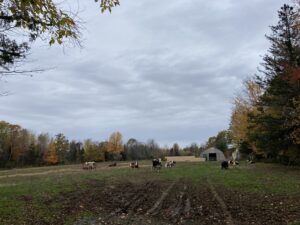
Bumbleroot Farm (Windham, Maine) - diversified veggies
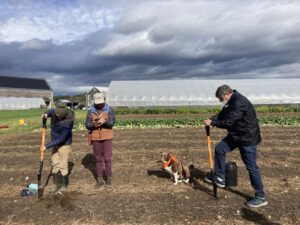
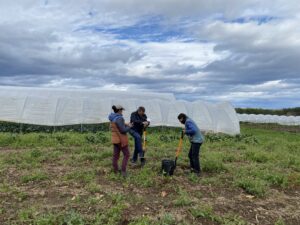
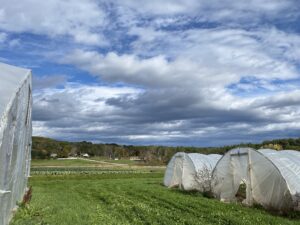
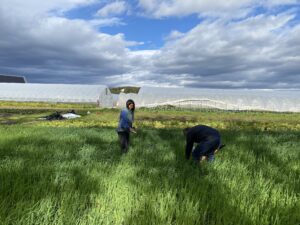
The Milkhouse (Monmouth, Maine) - dairy
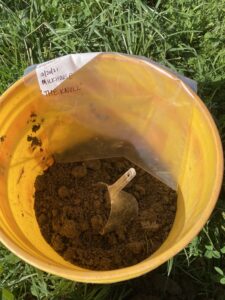
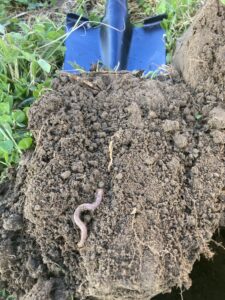
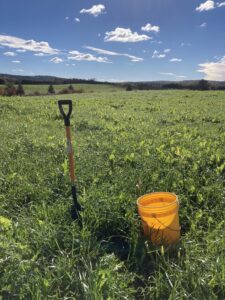
Songbird Farm (Unity, Maine) - diversified veggies and small grains - As noted above, Songbird Farm has decided to leave the Network as of January 2022. All soil health test results from Fall 2021 were still communicated to the farm.
South Paw Farm (Freedom, Maine) - diversified veggies
Two Coves Farm (Harpswell, Maine) - livestock ( cattle, sheep, hens)
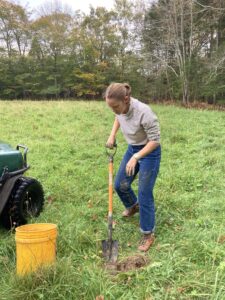
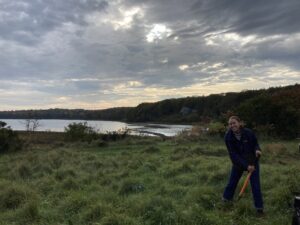
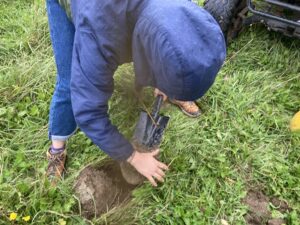
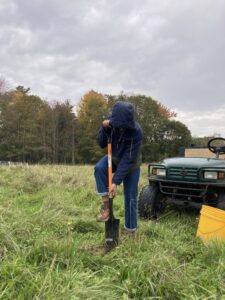
Erickson Fields (Rockport, Maine)- diversified veggies
Wolfe's Neck Center (Freeport, Maine) - Veg - WNC is a non profit collaborator, meaning we sample with them and Pasa will generate the reports, but WNC is responsible for payment
Aldemere Farm (Rockport, Maine) - cattle - non profit collaborator, meaning we sample with them and Pasa will generate the reports, but Aldemere is responsible for payment
Ketch Farms (Aroostook County, Maine): We were unable to sample at Ketch farms due to weather. Andrew Ketch has decided to back out of the Network as of January 2022.
Soil samples were taken from the following farms in fall of 2022:
High View Farm (Harrison, ME) - livestock (grassfed dairy)
Additional instagram Post from visit.
WoodHaus Farm (Waldoboro, ME) - Livestock (diversified, pigs, sheep, goats, chickens):
East Forty Farm (Waldoboro, ME) - Livestock (pigs, cows - dairy)
Sheepscott General Farm (Whitefield, ME) - Diversified Vegetable
Sunrise Farm (North Belgrade, ME) - Livestock (diversified, cows, goats, sheep)
Hunnewell Farm (Durham, ME) - Diversified Vegetable
Instagram post from fall soil sampling visit linked here.
Orange Circle Farm (Berwick, ME) - Diversified Vegetable
Spring visit at Orange Circle farm.
Stonecipher Farm (Bowdoinham, ME) - Diversified Vegetable
Six River Farm (Bowdoinham, ME) - Diversified Vegetable
Spring visit with Six River Farm.
Guimond Farm (Fort Kent, ME) - (cows - cattle)
Objective 3: Submit local data to Pasa’s Soil Health Benchmark Study for farmers to compare and learn about their soils
The Maine Soil Health Network is an official member of Pasa’s Soil Health Benchmark Study, a large multi-year study where soil health and management practices are compared to other similar farms, and each farm’s own past results, in an annual report. Pasa’s Soil Health Benchmark Study is a citizen-science project that began in 2016 that lets farmers comprehensively assess the health of their soils and see how their soil health data compares to the data of their peers. By identifying soil health benchmarks, this project gives farmers a clearer picture of whether their sustainable soil health management techniques are achieving their intended results, or if there is room for improvement.
Farmers submit their soil management data in the winter months, and receive a report analyzing their soil test results in the spring as part of Pasa’s Soil Health Benchmark Study. Pasa staff scientists organize this data and generate three additional management indicators: 1) days of living cover, 2) tillage intensity, and 3) organic inputs. These indicators provide a snapshot of some of the farm management practices that most influence soil health (Pasa, 2018). This grant covered the costs of soil tests and report production for farms in the program. MFT and WNC organized farmer forums and field visits to discuss soil health management strategies and collaborate to develop innovative yet practical solutions to common soil health issues. Farmers were encouraged to learn from their data and management practices of their peers both in the Maine cohort and within the benchmark study as a whole with fellow farmer cohorts in Pennsylvania and Maryland.
Objective 4: Coordinate ongoing farmer outreach, education, and collaborative engagement
Each cohort of the Maine Soil Health Network attended 3-4 meetings per year to collaboratively discuss observations, challenges, management practices, soil test results, and to get support with the technological and record keeping tools. These meetings took place in a ‘digital coffee shop’ format, at on-farm field days in the summer, and in fall/winter farmer-to-farmer workshops. These workshops and gatherings provided the opportunity for farmers to connect with a learning community of peers who are working to devise practical solutions to soil health challenges. Each workshop included facilitated discussions as well as space for providing feedback on the program.
Project educational funds were used to enable farmers to travel and learn at regional workshops, conferences and other events. Due to the on-going COVID-19 pandemic, farmers were much less interested in traveling long distances for conferences and trainings, after chatting with all of the farmers during our spring visits and fall workshop in 2022, we decided to expand the flexibility offerings for farmers educational stipends to include: training and local educational support, to accommodate their educational interests and desire to limit their travel. Additionally, with financial and travel support from PASA, all Maine Soil Health Network participants were given the opportunity attend the PASA Conference in February 2023. WNC and MFT co-designed the pre-conference workshop with PASA.
Objective 5: Develop a peer-to-peer network of farmers interested in soil health and climate resilience, to support one another and share field management techniques
Through the Soil Health Network, WNC and MFT sought to advance integrated and holistic approaches to the adoption of climate smart practices beyond the scope of on-farm practice implementation to include holistic farm planning through climate adaption planning, and to build community and educational opportunities around soil health and climate resilience for the general farmer population in Maine.
This project enrolled a total of 16 farms within Pasa's Soil Health Benchmarking study. As a part of this study farmers tracked on-farm management practices from 2021-2023 and soil sampled three times on their farm following the Cornell Comprehensive Assessment of Soil protocol. As a result farmers received 2-3 individualized benchmarking study reports from Pasa tracking the relationship between their management practices and soil health outcomes, as well as comparing their metrics to anonymized aggregate results from farms in the region and across the study.
The primary goal of the Maine Soil Health Network was to create a local collaborative of Maine farms, allowing for shared knowledge and building a community of farms interested in soil health. Through coordinated trainings, individualized technical assistance, and facilitated access to Pasa's broader network, farmers who engaged in Pasa’s Benchmark Study were able to improve their understanding of the health of their soils, and compare their soil health to their peer farms. The method of creating a peer learning cohort around enrollment in a research trial was successful and also improved the overall data set collected by Pasa to improve research understanding of the overall relationship between management and soil health outcomes across many eco-regions, soil types, and climatic conditions.
Education & outreach activities and participation summary
Participation summary:
A key objective of this project was facilitating shared learning among Soil Health Network (SHN) members, making outreach foundational to our work. We focused on knowledge-sharing, support and technical assistance, and strengthening connections for the 16 participating farms within the network, and catalyzing broader interest among farmers across Maine for the public events.
For MSHN farm participants we held three full-day in-person workshops to facilitate peer-to-peer reflections and learning, networking, and training. In fall of 2022 we held a full day workshop at the Ecology School, located in Saco, Maine with a focus on providing an opportunity for the farms in the network to spend time together during the off-season. This event was planned with two sessions, a morning session with a presentation from each farm on soil health lessons and challenges, and an afternoon session in facilitated breakout conversations to allow the groups to learn from each other and discuss practices implemented on farms. We had 1-2 representatives from 12 out of the 16 participating farms attend. Our January 2023 Event was focused on climate adaptation planning and we invited UMaine Professor, Dr. Rachel Schattman and her graduate students to lead educational content. This event took place at Viles Arboretum and was designed to support farmers with tools and training to link their on-farm soil health results to long-term climate adaptation planning. Finally in February 2024 we held a wrap up and climate adaptation planning event at Wolfe’s Neck Center. This event was focused on a share out of the climate adaptation planning process, and was also an opportunity for participants to share feedback on the full cohort program, the soil health benchmarking study, and learn about new funding and programming to support climate adaptation, soil health practice implementation, and further funding of the Pasa Soil Health Benchmarking study.
From 2021 to 2024, we hosted several public farmer-to-farmer tours and workshops at participating farms, showcasing a range of soil health practices. These events included: In June of 2021, a launch event at the Milkhouse, followed by a Farmer-to-Farmer event held at Bumbleroot Farm in fall. In Summer 2022, one Farmer-to-Farmer event was held at Stonecipher Farm in Bowdoinham focused the no-till practice demonstration. The event was attended by over 60 participants. Photos from MSHN Summer Field Day at Stonecipher Farm: https://www.instagram.com/p/Cf6vNWHLavv/ In fall of 2023, we hosted a workshop on silvopasture and explored themes of climate adaption, soil health, and financial planning themed workshop with Balfour Farm, the event was attended by 15 participants. We also hosted a contour farming and keyline design principles workshop with Sheepscot General Farm, the event was attended by ~30 participants.
In addition to in-person workshops, we organized webinars on soil health, climate adaptation strategies, and accessing climate-smart incentive programs. Notably, in January 2022 and 2024, we held webinars on interpreting Cornell Soil Health test results, featuring Bruce Hoskins and Jason Lilly from the University of Maine. In 2023, we collaborated with PASA to discuss soil health benchmarking reports.
We also provided six online training sessions, "virtual office hours," to assist farmers with Soil Health Benchmarking study data entry into SurveyStack, our record-keeping tool, across winters from 2021 to 2024.
Lastly, WNC and MFT staff visited 14 out of 16 farms to guide the creation of a climate adaptation plan, building off of soil health benchmarking study results and trainings from UMaine's Climate Adaptation Workshop and adapted from the Northeast Climate Adaptation Fellowship Program, through 3-5 meetings participants created the beginning of a long-term climate adaptation plan for their farms to address climate risks and build climate resilience in a holistic manner.
For public and farmer outreach, we've published a webpage for the Soil Health Network (MFT's webpage here). In 2022 we posted 2 blog posts (Building Farmer Networks for Soil Health, Training Farmers.), a press release at the close of the pilot program,, and 5+ social media posts across both MFT and WNC's platforms.
At the formal close of the pilot project in Q2 of 2024, Maine Farmland Trust has 9 out of 16 farms committed to continue in the soil health benchmarking study, funded through Pasa's Partnerships for Climate Smart Commodities (PCSC) program.
Selected photos from MSHN Events Between 2021-2024:
Silvopasture workshop at Balfour Farm
Photos from our Climate Adaptation Workshop held at Viles Arboretum in January of 2023.
Photos from our Winter Workshop held on December 13th at the Ecology School in Saco in December 2022.
Learning Outcomes
- Improved understanding of soil health on their farm and implementation strategies to improve the health of their soil through workshops, educational fund resources, and paired with detailed soil health and management monitoring on-farm through the Soil Health Benchmarking Study
- Increased awareness of specific climate change predictions in New England and location and farm operation specific adaptation approaches through participation in on-farm workshops and tours, climate adaptation workshop, and climate adaption process.
Project Outcomes
Through the soil health benchmarking study and Climate Adaptation Planning (CAP) process, participating farmers saw significant positive changes in their farming practices, particularly in recognizing the value of and connectivity between soil health management on farms implementing long-term financial and on-farm management planning for climate resilience. This process encouraged a shift toward a long-term perspective on climate adaptation, beginning with soil health monitoring and expanding to comprehensive whole-farm planning. The peer-to-peer education model also provided a platform for farmers to connect and receive support and explore emerging and challenging topics, such as dealing with climate extremes—this project spanned both a drought year and one of the wettest on record.
The partnership with Pasa on the soil health benchmarking study offered tangible support to farmers in management record-keeping and helped them develop comprehensive soil health monitoring plans. Many farmers used the study to document transitions in their farming practices, such as adopting silvopasture, converting to no-till, or introducing new crop rotations. This documentation not only supported on-farm decision-making but also contributed to Pasa’s growing dataset on the relationship between soil health outcomes and management practices.
A standout success story of the climate adaptation planning process is Bumbleroot farm, which developed a robust climate adaptation plan that has become a model for others. Additionally, three participating farms, after engaging in the CAP process, leveraged this support to seek further resources through Maine Farmland Trust, such as financial planning assistance, highlighting the role and connectivity between financial planning and practice implementation for building out a climate resilient farm. MFT has since further recognized this role and is seeking to integrate these resources further.
Peer-to-peer learning was a vital component of the program, with agroforestry/silvopasture and no-till diversified vegetable operations emerging as key themes. This collaboration encouraged farmers to connect through organized MSHN events, visit each other’s farms, and exchange insights on implementation challenges. It also provided Maine farms with access to additional resources through Pasa’s wider network in Pennsylvania and Maryland.
The education funds provided a unique opportunity for farmers to explore and learn from international agricultural practices. For example, one cooperator farm dealing with flood and resultant soil health challenges, visited the Netherlands to learn more and connect with farms operating in low lying floodplain systems, and a livestock farm focused on rotational grazing traveled to Germany to gain insights into cheese production and pastured grazing in a similar climate. Additionally, farmers engaged in low or no-till practices used these funds to bring consultants and technical assistance providers to their farms for direct consultations.
Lastly, one participating farm successfully applied for and received an on-farm demonstration grant to implement a new silvopasture project as a direct result of their participation within this project, further demonstrating the tangible benefits of the program.
The Maine Soil Health Network aimed to enhance soil health awareness among participating farms and establish a peer network for ongoing learning, ultimately improving soil health and climate resilience on Maine farms. This project employed a peer-to-peer learning model, engaging farmers in a community science research project, and provided them with technical assistance to develop long-term climate adaptation plans.
Key Successes
This pilot project, involving 16 farms, successfully:
- Supported farmers in conducting thorough soil health measurements and collecting management data, with most participants engaging in 3+ years of soil sampling. Many plan to continue this through MFT's partnership with Pasa Sustainable Agriculture’s USDA PCSC Climate Smart program, which funds continued soil sampling in addition to conservation practice implementation, many of which improve soil health.
- Developed a peer-to-peer network that enhanced knowledge-sharing around relevant soil health building practices in Maine, leading to further investment in outreach and technical assistance by MFT and WNC.
- Secured additional funding in 2023 to integrate elements of this pilot project into MFT’s core programming, expanding its impact and ensuring the continuation of farm enrollment in the soil health benchmarking study and climate adaptation planning. This included additional funding for mini-grants and direct assistance to support farms in implementing practices aligned with their goals.
Challenges and Methodology Revisions
While the project was largely successful, challenges arose for some farmers in maintaining and submitting management records within Pasa’s Soil Health Benchmarking Study. To address these issues, WNC and MFT provided valuable feedback to Pasa, leading to improvements in the study, such as more streamlined data collection processes and direct technical assistance for farmers. These adjustments have informed our approach moving forward, and through WNC’s recently acquired funding through the USDA PCSC, further collaboration with Pasa is planned to continue enhancing technology usability and data collection protocols for farmers.
Need for Additional Work
Although this project has taken significant steps in expanding a community and network of farmers and technical assistance opportunities to increase climate resilience on Maine farms, there is a need for further investment in technical assistance to support long-term transitions and adaptations on farms. One area that would particularly benefit the farming community is an increased focus in training technical assistance providers on best practices for conservation practices such as agroforestry, silvopasture, and no/reduced tillage in Maine. Additionally, preparing the TA community to advise on climate challenges that are affecting Maine in particular, such as research studies on the effectiveness of certain practices and adaptations strategies to address “too much, too little water” precipitation whiplash, excessive heat, and the effects of water winters on soil health for livestock farmers.
Future Directions:
MFT has expanded its Climate Resilience programming to include broader technical assistance and grant opportunities. Additionally, WNC is continuing to build on the technical assistance and farmer education elements of this project, particularly in promoting climate-smart grazing practices with the New England Grazing Community.
The findings from this project will be particularly beneficial to policymakers, and agricultural technical assistance organizations looking to implement impactful outreach and technical assistance programs to support farmers in navigating climate resilience practice implementation in Maine.
